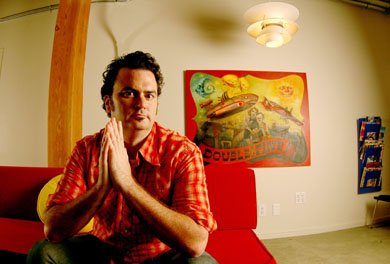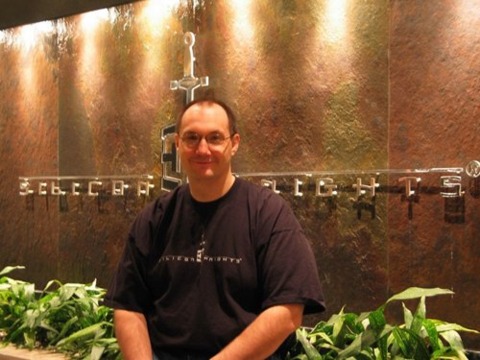Double Fine, BioWare, Silicon Knights, Bungie on storytelling
PAX 2009: Tim Schafer, Greg Zeschuk, Denis Dyack, Joseph Staten weigh in on the power of interactive narrative and the ways it can be delivered successfully.
Who Was There: The "Medium Is the Massage: Story Matters" panel at the 2009 Penny Arcade Expo featured a few names that might sound familiar, as well as a somewhat ambiguous intentional typo in its title. On hand were Double Fine's Tim Schafer, BioWare's Greg Zeschuk, Silicon Knights' Denis Dyack, and Bungie's Joseph Staten.

What They Talked About: Storytelling and the gaming industry have a love-hate relationship. On the one hand, the medium offers near-endless possibilities on the types and ways in which a story can be told. On the other, most players just want to get into the action and kill stuff. This and other topics were discussed in a story-driven panel lorded over by some of the biggest names in the gaming industry.
Leading off the proceedings, the moderator elicited opinions on what, exactly, interactive storytelling is. For BioWare cofounder Zeschuk, interactive storytelling entails in-game narrative, such as dialogue, choices, and environmental tells, as well as out-of-game experiences. He then gave the example of sharing "watercooler" stories, where players recount their experiences about what they did with others, outside the game.
Staten offered similar sentiments, saying that interactive storytelling involves giving players a sandbox so that they can tell their own stories that originate from the game. He gave the example of two brothers in a multiplayer match, one of whom sneaks up on the other and shoots him with a shotgun in the back. That's an experience that can be recounted, and will be recounted, for a long time to come, he said.

Dyack and Schafer offered similar opinions on interactive storytelling, saying that it involves all aspects of a game, from audio to art to technology to gameplay. Schafer went on to note that his studio's ultimate goal is to give players an experience where they become completely absorbed in the world they've created.
As for how story comes about, Zeschuk said that BioWare "spends an inordinate amount of time building the world." He said the writing team fleshes out the entire universe in which a game takes place, spending a year or so working on everything from political structure to the world's history.
The moderator then asked Schafer how the story for Double Fine's Brutal Legend came about. According to Schafer, the idea was an amalgam of wanting to create a game where a warrior leads a massive army into the field of battle and a "rip off" of Mark Twain's classic A Connecticut Yankee in King Arthur's Court," where a man from the future travels back in time wielding advanced technology.
The same question was asked of Silicon Knights' Too Human, to which Dyack responded that he wanted to comment on the effects of technology on society. He then offered a brief recounting on the history of black glass, saying that it can be formed, as far as anyone can tell, only by the intense heat generated by a nuclear explosion. Oddly, black glass was found in the tombs of ancient Egyptians. This gave him the idea of positing Norse mythology as fact, and the abuse of technology brought civilization to its knees.

With the Halo universe now spanning several games, books, and comics, Staten was asked if Bungie initially set out to create such a massive universe. Staten's response echoed Zeschuk's, in that he said the team from the beginning gave themselves head room by plotting out a reaching scope for the Halo universe that would allow the franchise to grow.
Schafer then discussed how much story is dictated by gameplay, and vice versa. For Brutal Legend, he said, the game involves a biker, so there obviously needed to be some kind of action. The story and the gameplay are woven together as a game is being developed, he said, and both often change to accommodate the other.
The next question was directed back at Dyack and involved the multiple characters that were interwoven into Silicon Knights' Eternal Darkness. According to Dyack, crafting that story was challenging on multiple fronts, not the least of which was selling Nintendo on the GameCube exclusive. "To say to Nintendo, we want to do a game with multiple characters, and then say we're going to kill most of them, was not easy," he said.
The discussion then turned to cutscenes and whether or not they play a detrimental role in telling an interactive story. Staten quite bluntly noted, "I think the main thing is just don't make the cutscenes suck." Immersion, he continued, can be broken by any number of things, including cutscenes. What cutscenes do well, he said, was anchor the pacing of the game by giving players a bit of a breather after an intense action sequence, a point which Zeschuk and Dyack both concurred.

Schafer noted that cutscenes can be problematic during dramatic moments, because, for example, players want to be the ones who deliver the final blow. Players do not want to watch the event unfold during a cutscene, he said.
The formal component of the panel closed with Zeschuk talking about how BioWare keeps all of the story elements and mythology built into the studio's games in order. "We use the power of technology," was Zeschuk's reply.
Quote: "Can you have a World War II tank, a mastodon, and Satan all together in the same place? The answer is yes!"--Tim Schafer, talking about...something.
Takeaway: While the role of storytelling within games is cause for debate throughout the industry, the fact remains that the potential to tell meaningful and impactful tales exists. As the industry continues to mature, the panel concurred that intricate and diverse stories will begin to thrive.
Got a news tip or want to contact us directly? Email news@gamespot.com
Join the conversation